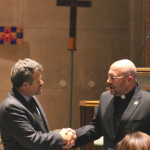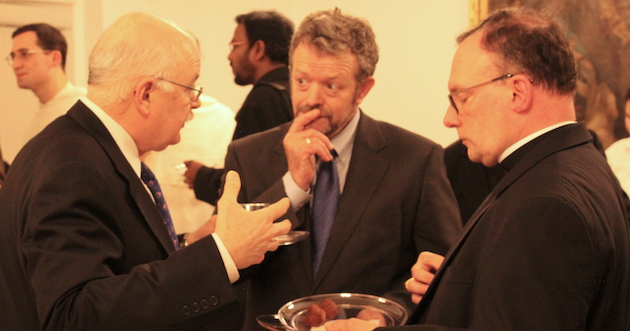Why Study Ecumenism Today? (Dr. Larry Golemon, Certificate Director)
 Ecumenism is the witness to Christian unity and the work toward its greater realization–through theological dialogue, liturgical renewal, and collaboration in ministry and public issues. After the heyday of ecumenism with founding of the World Council of Churches, Vatican II and the formation of hundreds of national Councils of Churches, the cultures of competition and secularism pressured many Christian denominations to retreat from ecumenism into survival mode. The question today is, “is this winter of ecumenism over, and has a new springtime beginning?” Many in the Consortium believe so, as they point to new forms of collaboration and dialogue–including faith-based social ministries, the renewal of Mission among and between churches, the multi-traditioned nature of emergent churches, and greater dialogue between Catholics and Evangelicals. While the historic forms of ecumenical work continue, new patterns are on the rise.
Ecumenism is the witness to Christian unity and the work toward its greater realization–through theological dialogue, liturgical renewal, and collaboration in ministry and public issues. After the heyday of ecumenism with founding of the World Council of Churches, Vatican II and the formation of hundreds of national Councils of Churches, the cultures of competition and secularism pressured many Christian denominations to retreat from ecumenism into survival mode. The question today is, “is this winter of ecumenism over, and has a new springtime beginning?” Many in the Consortium believe so, as they point to new forms of collaboration and dialogue–including faith-based social ministries, the renewal of Mission among and between churches, the multi-traditioned nature of emergent churches, and greater dialogue between Catholics and Evangelicals. While the historic forms of ecumenical work continue, new patterns are on the rise.
The Purposes of this Certificate are (a) to give students a deeper ecumenical knowledge; (b) to enable students to assume positions of ecumenical leadership in their local communities; and (c) to provide a foundation for the future study of ecumenism.
The certificate may be earned by any “ Master’s level or higher degree or certificate student” who enrolls in one of the member schools, on a full-time or part-time basis. [Consortium Practices booklet, 2005]. Contact the Consortium office (202-832-2675) for recommendations if not already enrolled. Students will complete an enrollment form for the program and submit it to the Director, before or soon after courses begin.
Ecumenism Certificate Enrollment Form
To receive the Certificate in Ecumenism, the student must complete a total of twelve credits in courses related to ecumenism that are offered in the Consortium member schools.
Required Courses (3 credits each)
- History and theology of the ecumenical movement
- Bilateral or multilateral dialogues in ecumenism
- Interreligious dialogue-with one or more other religions
- Elective (in a tradition other than one’s own, or in areas of inter-denominational ministry, ethics, or dialogue between traditions).
Three credits may be allowed (1) from a pastoral placement in an institution of another tradition–with appropriate ecumenical reflection or (2) from an ecumenical immersion experience in one of the member schools. To see current courses that qualify, do a course search under “Certificate in Ecumenism.”
The students’ course selections must lead to a broad familiarity with the varied Christian faith communities. Normally at least two of the courses for the certificate will be offered by professors from traditions other than that of the student, and at least one on another campus than one’s own. The student must complete all requirements in a timely fashion in accord with the policies of her/his home institution.
The Certificate Director will serve as advisor to all students in the program, and he or she will approve the course selection by the students. The Director will survey the Ecumenism Committee each year to ascertain which courses listed in the schools are eligible for the certificate, and he or she will report to the deans.
Students currently matriculated in one of the schools of the Consortium may apply courses already taken to the certificate program with the approval of the Director. [This privilege will not extend to students who have already graduated.]
